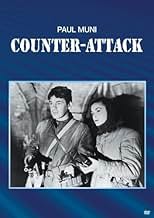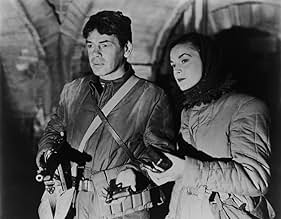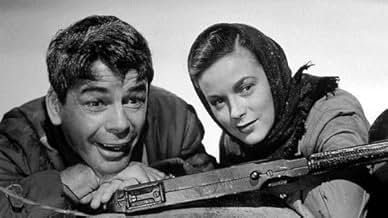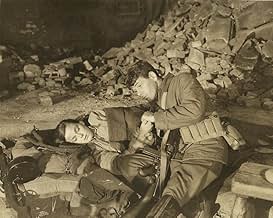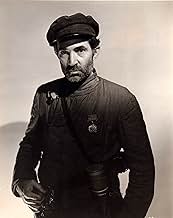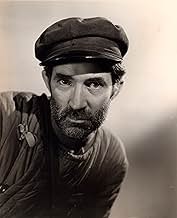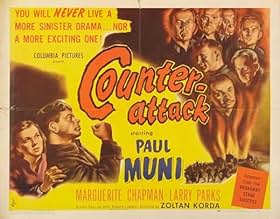VALUTAZIONE IMDb
6,8/10
590
LA TUA VALUTAZIONE
Aggiungi una trama nella tua linguaDuring WW2, a Mexican stand-off ensues between a group of German soldiers and a team of Soviet fighters trapped together in the basement of a bombed-out Russian building.During WW2, a Mexican stand-off ensues between a group of German soldiers and a team of Soviet fighters trapped together in the basement of a bombed-out Russian building.During WW2, a Mexican stand-off ensues between a group of German soldiers and a team of Soviet fighters trapped together in the basement of a bombed-out Russian building.
- Regia
- Sceneggiatura
- Star
Wolfgang Zilzer
- Krafft
- (as Paul Andor)
Louis V. Arco
- German Colonel
- (non citato nei titoli originali)
John Bagni
- Paratrooper
- (non citato nei titoli originali)
Trevor Bardette
- Petrov
- (non citato nei titoli originali)
Richard Bartell
- Ostrovski's Assistant
- (non citato nei titoli originali)
Recensioni in evidenza
Counter-Attack, a film celebrating the Russian contribution to the victory of Nazism, earned a place in history for the blacklisting of screen writer John Howard Lawson, member of the Hollywood Ten and a guy who really was a Marxist. He never denied it during his lifetime.
Nevertheless the Russian contribution was certainly real enough and red enough and that's not a political statement either. Paul Muni and Marguerite Chapman play a pair of Russian soldiers who get trapped on the wrong side of the front in a cellar with seven members of the German Army of varying feelings about their leader. Muni and Chapman are on an advance mission to obtain intelligence and they're certain one of their 'prisoners' is an officer in disguise. How to ferret the information from these men is the question.
The film is one claustrophobic exercise and on stage it was done only on the one set of the cellar. It was based on a Russian play Pobyeda and ran under the name Counter-Attack on Broadway during the 1943 season for 85 performances. Morris Carnovsky originated the role Paul Muni has in the film.
Since both sides have no idea who will rescue them eventually it becomes quite a cat and mouse game with Muni and Chapman fighting fatigue. Yet they have a few tricks of their own.
Counter-Attack is a well acted film with Paul Muni under a lot of effective directorial restraint and the ever present helpful hints from his wife Bella. They were one interesting combination, Bella knew her man well and was his best critic. Of course directors getting the idea that they were in charge did not want her around. Harry Cohn got her off the set of A Song To Remember and without her there, the result was Muni's hammiest performance.
Counter-Attack is not a great war film and it got buried during the McCarthy era. Still it's decent enough wartime propaganda and we can view it now with the history of the times in mind.
Nevertheless the Russian contribution was certainly real enough and red enough and that's not a political statement either. Paul Muni and Marguerite Chapman play a pair of Russian soldiers who get trapped on the wrong side of the front in a cellar with seven members of the German Army of varying feelings about their leader. Muni and Chapman are on an advance mission to obtain intelligence and they're certain one of their 'prisoners' is an officer in disguise. How to ferret the information from these men is the question.
The film is one claustrophobic exercise and on stage it was done only on the one set of the cellar. It was based on a Russian play Pobyeda and ran under the name Counter-Attack on Broadway during the 1943 season for 85 performances. Morris Carnovsky originated the role Paul Muni has in the film.
Since both sides have no idea who will rescue them eventually it becomes quite a cat and mouse game with Muni and Chapman fighting fatigue. Yet they have a few tricks of their own.
Counter-Attack is a well acted film with Paul Muni under a lot of effective directorial restraint and the ever present helpful hints from his wife Bella. They were one interesting combination, Bella knew her man well and was his best critic. Of course directors getting the idea that they were in charge did not want her around. Harry Cohn got her off the set of A Song To Remember and without her there, the result was Muni's hammiest performance.
Counter-Attack is not a great war film and it got buried during the McCarthy era. Still it's decent enough wartime propaganda and we can view it now with the history of the times in mind.
During World War II, Hollywood did something they never would have dared do before the war or only a couple years after the war...they made Pro-Soviet movies. In films such as "The North Star" and "Song of Russia", the Russian people are portrayed as noble, decent and, above all, America's friends. Why? Well, because the Soviet Union was an ally of the USA during much of the war...and the films were propaganda pieces aimed as softening the views Americans had of the USSR (which had often been very negative before this). "Counter-Attack" is another of these pro-Soviet films. Now this isn't saying it's bad...but it did serve the purpose of improving American perceptions of these allies.
The plot of this one is very simple. A pair of Russian soldiers are trapped under debris in the basement of a building...and there are about a half dozen Germans trapped with them. Alexei (Paul Muni) has gotten the drop on them...disarming them and taking them prisoner. But he cannot escape...and while they are trapped, he decides to ask these Germans questions, as he has good reason to believe that one of them is an officer in disguise as an enlisted man. But time is working against him, as he cannot sleep or they'll kill him. And, he hopes that his Russian comrades come before the Germans do to rescue them.
This film isn't as wide-eyed and saccharine as the pro-Soviet films I listed above. Instead, it's intelligent without laying the propaganda on too thickly. As a result, it's a very good film...and isn't yet another silly pro-Russian story. The only negative is that the story, at times, tends to be rather talky.
The plot of this one is very simple. A pair of Russian soldiers are trapped under debris in the basement of a building...and there are about a half dozen Germans trapped with them. Alexei (Paul Muni) has gotten the drop on them...disarming them and taking them prisoner. But he cannot escape...and while they are trapped, he decides to ask these Germans questions, as he has good reason to believe that one of them is an officer in disguise as an enlisted man. But time is working against him, as he cannot sleep or they'll kill him. And, he hopes that his Russian comrades come before the Germans do to rescue them.
This film isn't as wide-eyed and saccharine as the pro-Soviet films I listed above. Instead, it's intelligent without laying the propaganda on too thickly. As a result, it's a very good film...and isn't yet another silly pro-Russian story. The only negative is that the story, at times, tends to be rather talky.
Recently saw this movie on TCM. Very powerful. It concerns a Russian soldier (Paul Muni) and a female resistance agent (well played by Marguerite Chapman, who I'm not familiar with) trapped in a bombed factory (?) with seven Germans. The director has some better known films, including "Four Feathers." Muni is well known. The others appear to be character actors.
It becomes a battle of wills, most of the action taking place in a condensed space -- the small area they are trapped in. But, meanwhile, we also get some excellent shots of the happenings outside in the battlefield and thereabouts. These add a nice touch to the movie, realistically so as well (a sort of newsreel feel in some cases).
The movie has a 1945 publication date but is played basically straight. It is always interesting as well when Russians are the good guys.
It becomes a battle of wills, most of the action taking place in a condensed space -- the small area they are trapped in. But, meanwhile, we also get some excellent shots of the happenings outside in the battlefield and thereabouts. These add a nice touch to the movie, realistically so as well (a sort of newsreel feel in some cases).
The movie has a 1945 publication date but is played basically straight. It is always interesting as well when Russians are the good guys.
An engrossing WW2 film set somewhere on the Russian Front with Paul Muni as a member of a Russian assault team who is trapped in a collapsed building with seven German soldiers, one of whom is an officer. Along with him is Margarithe Chapman as a Russian partisan. His character is in the lead part of a big Russian counter-attack that is to be launched across a river on a bridge that's being built eighteen inches under the surface of the water. The setting in the collapsed building with the German soldiers whom he has captured and is trying to extract information from is beautifully done with tension and humor amidst fading light, all captured by cinematographer James Wong Howe, one of the greats of B&W photography (and color, too if you've seen Picnic). Maybe Muni was a tad bit better in I Am A Fugitive From A Chain Gang, but he's awfully good here as a crafty Russian fighting sleep deprivation and fading light. The Germans are great as well, each getting enough lines to establish himself. Margarithe Chapman's part as Muni's comrade captures the idea of equality in the ranks among men and women. She's tough but tender.
Seldom does a film capture the tone of the moment of significant historical events. This movie indeed does. One of the most dramatic events of World War Two was the counter attack by the Soviet troops against the Nazi invaders. The power of it all is beyond comparison to this very day. This film gives the audience a good account of the action, the drama, and the sense of just how far the Russians would go to drive the German army from its land. Paul Muni is extraordinary, and his acting gives meaning to the theme of this film that "there is no such word as impossible." In this movie, the heroic revenge of the Russians is exceeded only by the terror of it all.
Lo sapevi?
- QuizUnderwater bridges were a real Soviet Army engineering feat used in WWII. A report on such submerged bridges was published in the U.S. War Department's journal "Tactical and Technical Trends", no. 29, July 15, 1943.
- Curiosità sui creditiOpening credits prologue: In 1942, Russia had been invaded to a depth of a thousand miles, and her armies seemed crushed. The world didn't know that these same "beaten" armies would turn, take back every foot of ground they had lost and then invade Germany itself.
One night in this same year, 1942 . . . .under cover of fog . . . .Russian engineers were engaged in a strange activity . . . .on a river, facing the German lines . . . . .
- ConnessioniReferenced in Come eravamo (1973)
I più visti
Accedi per valutare e creare un elenco di titoli salvati per ottenere consigli personalizzati
Dettagli
- Tempo di esecuzione1 ora 30 minuti
- Colore
- Proporzioni
- 1.37 : 1
Contribuisci a questa pagina
Suggerisci una modifica o aggiungi i contenuti mancanti

